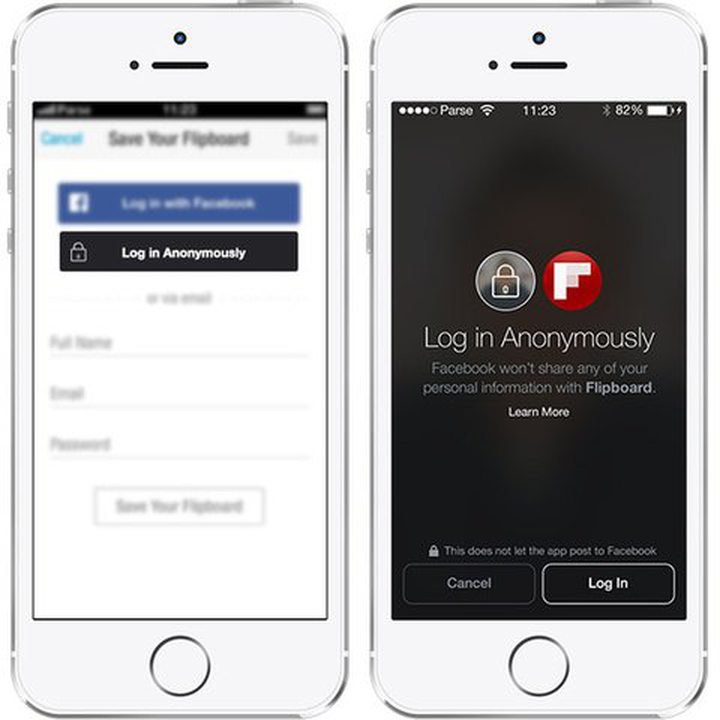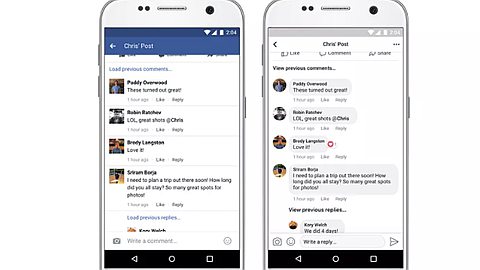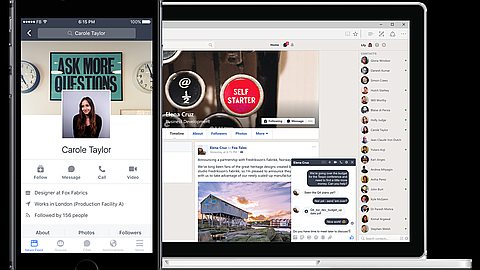Facebook to Let Users Limit Data Revealed by Log-Ins

The social network announced on Wednesday that when its 1.3 billion users log in to other websites or mobile apps through their Facebook identities, they will be able to limit what they reveal to the site or app to just their email addresses and public profile information, like name and gender. Before, depending on the app or site, the simple act of using the Facebook log-in exposed much of their Facebook information to that app or site.
The social network also announced that it was testing a feature to allow people to use their Facebook identity to log in to other sites or apps through a button marked “Log in anonymously.”
Users who choose that button would not be anonymous to Facebook, which will continue to collect the information about what apps its users are active on — data that is useful for targeting ads. But no personal information would be revealed to the outside service.
Both these moves respond to longtime complaints raised by many users who object to requests for personal data, and who object to being asked to log in through Facebook. Even Mark Zuckerberg, Facebook’s co-founder and chief executive, seems to share these concerns.
“I install a lot of apps,” Mr. Zuckerberg said in an interview at the company’s conference for application developers on Wednesday in San Francisco. “If it looks like it’s kind of sketchy, no, I don’t want to give it access to my messages and every part of Facebook. I think that’s something a lot of people can empathize with, and we just want to give them the tools to help mediate that.”
While the changed rules involving Facebook log-ins are likely to be popular with Facebook users, app developers will lose access to valuable information about their customers.
But Facebook is offering them other inducements to work with the social network. The company formally announced a new mobile ad network that can tap Facebook’s knowledge of its users to place targeted ads inside other companies’ apps, with Facebook and the app maker sharing the revenue. Facebook had already been testing this network on a smaller scale for several months.
Google and Twitter offer app developers access to similar ad networks.
Mr. Zuckerberg said Facebook’s “Log in anonymously” button would also persuade more people to try new apps.
“As many as two-thirds of people who download an app don’t ever create an account,” he said. App makers are better off “making it so people can sign in and get into the experience,” and then persuade them to reveal their identities later.
Mr. Zuckerberg’s long-term goal is to make Facebook a platform on which many other apps run, with Facebook accounts used as a universal identity card to log in everywhere. Widespread use of Facebook identities would give the social network valuable data to help sell more ads, its principal source of income; keep users attached to the service; and increase the company’s influence in the tech world.
“The more that people can move through these experiences, the more likely it is that they will want to share content or will want to do something that ends up creating revenue,” Mr. Zuckerberg said.
To persuade outside developers to offer Facebook log-ins on their sites and apps, Facebook has agreed in the past to share information about its users, from birth dates and likes to lists of their friends and even photos.
That has led to abuses, with games like FarmVille at one point badgering all of a player’s friends to sign up to try to increase usage.
But the policy has also helped Facebook corral about half the market for so-called social log-ins — although Google is a fast-rising challenger, and LinkedIn and Twitter are popular log-ins for certain applications.
The company says about 10 billion social log-ins were made last year using Facebook identities. Industry analysts say social log-ins are becoming more popular in part because cellphone users find it easier to click one button to log in with a social network instead of typing out new account information for every app.
However, Facebook’s user surveys and outside research have found that many consumers are not happy with this system.
Patrick Salyer, chief executive of Gigya, which helps about 700 companies manage social log-ins, said a 2013 survey by his company found that nearly half the people it polled had not used social log-ins.
“The No. 1 thing they were afraid of was their data was being sold,” he said. “Another concern was that their news feed would be spammed without permission or their friends would be spammed without permission.”
Privacy has been a sore point for Facebook, which has a long history of promising to protect user privacy, then proceeding to violate it.
In 2012, the company agreed to settle charges brought by the Federal Trade Commission that it had disclosed users’ personal information without their permission to outside app developers and advertisers. The company is still tied up in court over its practice of turning likes and comments made by users into ads sent to their friends.
Regulators’ distrust of Facebook on privacy is so high that when the F.T.C. approved the company’s $19 billion acquisition of the mobile messaging service WhatsApp a few weeks ago, a top agency official formally warned Facebook to honor the privacy promises made by WhatsApp.
Facebook has typically pushed the envelope on privacy by automatically exposing users’ information to more people and then giving them a way to opt out. The company’s new Messenger app, for example, shares a user’s location with friends unless it is explicitly turned off.
Some analysts said the new log-in system and the company’s April rollout of Nearby Friends suggest that Facebook might be starting to take privacy more seriously.
Nearby Friends allows smartphone users in the United States to broadcast their locations to friends, but only if users deliberately turn it on.
“Facebook has been beaten up over time over their privacy issues, and they are taking steps to address it,” said Brian Blau, an analyst at the research company Gartner.
Facebook spent the better part of two years testing different designs for its new log-in before finally settling on the current line-by-line controls that Mr. Zuckerberg announced to developers.
A key principle in the new setup is that an app should ask for personal information only when it is necessary and then explain how sharing will help the person doing it.
The “Log in anonymously” button would take things even further.
“People would be able to log in to use or try apps without sharing information,” said Eddie O’Neil, the product manager for Facebook log-in. All that the app would get is an identification number.
For app makers, forgoing all personal information is “a big risk,” said Andrew Maltin, the chief executive of Hang With, a video streaming app that is one of the first companies to try the anonymous log-in feature. “We may lose some of our people who would typically give us everything.”
But Mr. Maltin said it’s worth the gamble: About 21 percent of the people who download Hang With give up when they hit the account registration screen, and he thinks the “Log in Anonymously” option will win them over. After they have used the app for a while, Hang With will ask users for more. “It becomes our responsibility to show a user that we’re trustworthy,” Mr. Maltin said.





